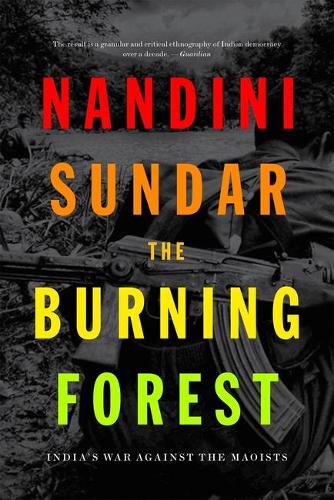
The Burning Forest: Indias War Against the Maoists
(Hardback)
Available Formats
Publishing Details
The Burning Forest: Indias War Against the Maoists
By (Author) Nandini Sundar
Verso Books
Verso Books
3rd June 2019
9th April 2019
United Kingdom
Classifications
General
Non Fiction
Asian history
954.137
Physical Properties
Hardback
430
Width 162mm, Height 235mm, Spine 29mm
767g
Description
An empathetic, moving account of what drives indigenous peasants to support armed struggle despite severe state repression, including lives lost, and homes and communities destroyed
Over the past decade, the heavily forested, mineral-rich region of Bastar in central India has emerged as one of the most militarized sites in the country. The government calls the Maoist insurgency the "biggest security threat" to India. In 2005, a state-sponsored vigilante movement, the Salwa Judum, burned hundreds of villages, driving their inhabitants into state-controlled camps, drawing on counterinsurgency techniques developed in Malaysia, Vietnam and elsewhere. Apart from rapes and killings, hundreds of "surrendered" Maoist sympathizers were conscripted as auxiliaries. The conflict continues to this day, taking a toll on the lives of civilians, security forces and Maoist cadres.
In 2007, Sundar and others took the Indian government to the Supreme Court over the human rights violations arising out of the conflict. In a landmark judgment in 2011 the court banned state support for vigilantism. The Burning Forest describes this brutal war in the heart of India, and what it tells us about the courts, media and politics of the country. The result is a fascinating critical account of Indian democracy.
Reviews
A very important and interesting book which should be widely read A deeply disturbing analysis of the sacrifice of tribal lives and communities caught between the camouflaged barbarity of the security forces and the violent arrogance of a deflected rebellion. The appeal for reasoned humanity cannot be any strongeror more eloquentthan this.
Amartya Sen
How does democracy affect the prosecution of civil war Nandini Sundar explores this question with untold courage and fierce determination in her remarkable extended ethnography of counter-insurgency in Chhattisgarh (India)a desperate struggle to clear the land for mineral exploitation. Starting from poor adivasi villagers, aided and abetted by Naxalites, Sundar lays out in dispassionate detail the history of escalating violence, spurred on by the atrocities of a state-sponsored vigilante group and special police force. Stung by the lack of interest in the Indian media and parliament, she and two collaborators pursued and finally won a Supreme Court case against the state of Chhattisgarh. But, again, with no obvious effect. By multiplying opportunities to contest state violence, democratic institutions may have moderated but also extended the civil war. A rare and brilliant treatment of a topic few social scientists would dare to touch, let alone examine at such close quarters and for over two decades.
Michael Burawoy
The Burning Forest is vivid, challenging and informativean exemplar of engaged sociology and anthropology. It is a stellar account of the tension between villagers, insurgents and the multiple levels of state action and inaction, the intricate complications of the legal system and of course, the politics of it all. Nandini Sundars empathy for the people of the forest and their struggles for a dignified life and livelihood is heart-warming.
Ari Sitas
This meticulous and powerful book not only documents a brutal regime of internal colonialism in the worlds largest democracy. It reveals the insidious ways in which consent to state oppression is manufactured and amplified. Everyone interested in the commingled fate of democracy and capitalism in the postcolonial world should read this book.
Pankaj Mishra
Nandini Sundar, an extraordinary anthropologist-activist, pulls no punches in describing the greed and cynical violence of state agencies, mining companies, politicians and immigrants. Her account of life in the Maoist rebel zones is graphic, full of empathy but by no means uncritical. This is a story that everyone who cares about India must read.
Partha Chatterjee
Nandini Sundar is one of Indias most distinguished anthropologists, and the leading academic authority on Bastar. But she is also one of Indian democracys most passionate voices. This is a searing critique of the state, and one that Indian democracy needs to hear.
Pratap Bhanu Mehta
Every thinking Indian, every citizen who is concerned about the present and future of the Republic, should read The Burning Forest. It is an impeccably researched and finely written work of scholarship, redolent with insight, and displaying enormous courage as well.
Ramachandra Guha, Hindustan Times
If many places are like Bastar, few books are like The Burning Forest. It resonates with classics on frontiers and dispossession.
Christian Lund, Journal of Agrarian Change
Sundars book is an exceptional expose of the scandal of rural governance in India, a chronicle of State excesses, an anthropologists view about how conflicts perpetuate themselves and an account of how Indias democracy is degraded when few are watching. Policymakers ought to take away one the key lesson from it that there really are no military solutions to social conflicts.
Sushil Aaron, Hindustan Times
Sundars book is a must-read for those interested in the genesis and the nature of conflict in Bastar.
Hindu
The work needs to be celebrated for its scholarship, for its independence and for its courage.
Tribune
Author Bio
Nandini Sundar, professor of sociology, Delhi University has been visiting Bastar for over 25 years. Her first book, Subalterns and Sovereigns: An Anthropological History of Bastar (1854-1996) is an authoritative account of Bastar's colonial and post-colonial past.
